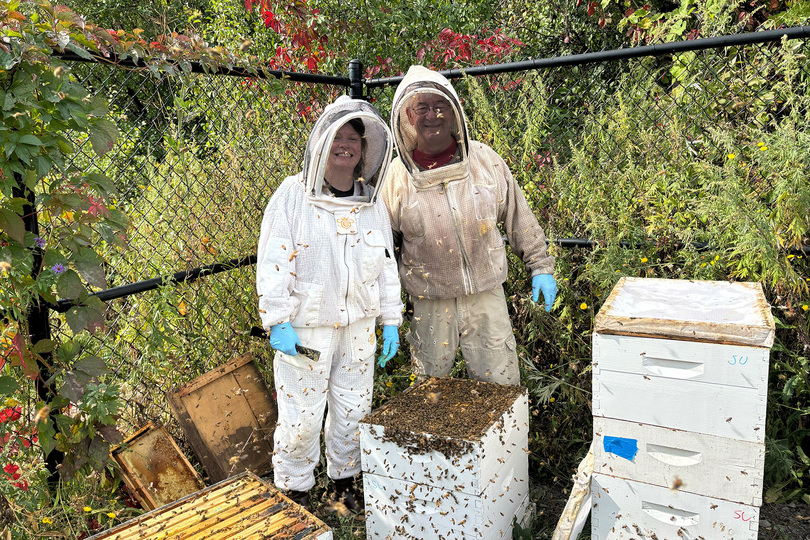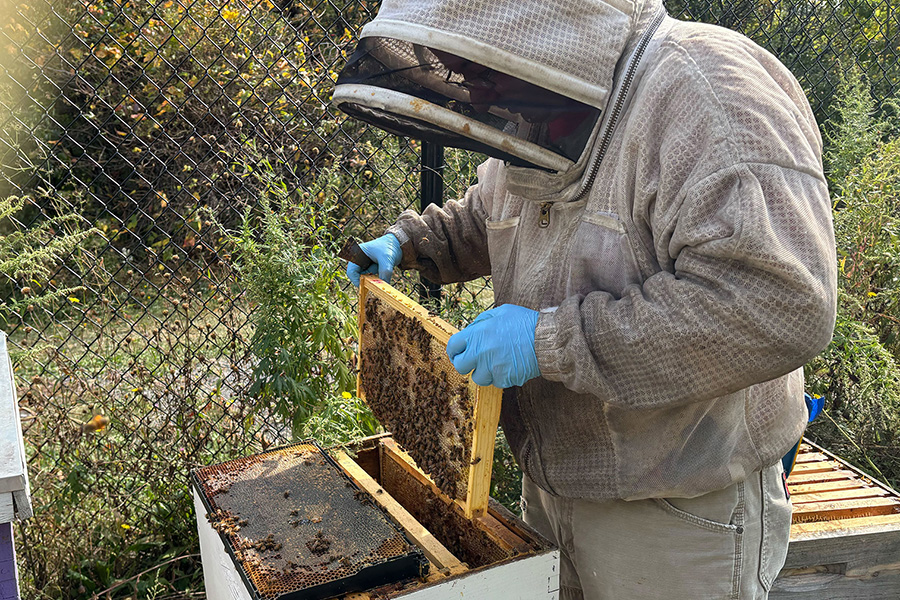Syracuse Honey’s mission to help bees at South Campus hives

Local beekeepers Bob Faulkner, owner of Syracuse Honey, and Alicia Higgins prepare to treat the bees and collect honey from 10 hives located on SU’s south campus, home to over 800,000 bees. Kate Jackson | Asst. Copy Editor
Get the latest Syracuse news delivered right to your inbox.
Subscribe to our newsletter here.
As Bob Faulkner began suiting up in his protective bee attire — a netted face mask and sticky plastic gloves — for his semi-weekly visit to the Syracuse University beehives, he started explaining the importance of bees.
Faulkner, owner of Syracuse Honey and local beekeeper, and his colleague, Alicia Higgins, prepared to treat the bees and collect honey from 10 hives located on SU’s south campus, home to over 800,000 bees.
“They are amazing creatures, and they’re so important to our planet,” Faulkner said. “And I mean planet. I don’t randomly use that word. Planet means everybody’s involved in this mission of making sure bees survive.”
Although he retired a decade ago, Faulkner said he’s not sure beekeeping qualifies as retirement.
Faulkner, 71, started Syracuse Honey around 10 years ago after he was reintroduced to beekeeping through local clubs. Faulkner said he knew he wanted to be a beekeeper since he was 12 years old, but wasn’t able to realize his passion until he retired, a former IT professional.
He started with two hives in his backyard, which grew to 150 across the east side of Onondaga County. Faulkner said most people who understand the importance of bees let him use their yards.
“I said ‘I could make a little bit of money with this,’” Faulkner said. “Do more for the bees, and the more I do for the bees, the more I get.”
Syracuse Honey’s mission is to save honeybees through relocation and sustainable honey harvesting. The website, built by Faulkner’s son Anthony, hosts an online honey shop, emergency bee removal services and educational resources on beekeeping. One page is even dedicated to the health benefits of honey.
Faulkner said anything yellow and black that flies often gets mistaken for a bee, which is why some students have noted an uptick of bees on campus. He attributed the rise to peak yellowjacket season, normally late summer into early fall.
Unlike other insects, bees have been disappearing due to climate change, parasites and habitat loss. Faulkner said the most recent issue has been mite infections, which he treats with oxalic acid.
Faulkner also offers bee removal and relocation services. He said if someone contacts him through the website, it goes straight to his mobile phone, and he’ll help identify the species and provide the most cost-effective solution.
Higgins was promoted to full-time at Syracuse Honey after working as an intern since May. Originally from Washington, she studied horticulture — the art and science of cultivating plants — where she first became interested in bees.
Higgins said she learned “so much” from her colleagues, including Faulkner. She first met Faulkner through her honey bee biology and beekeeping class, when she had to interview a local beekeeper. She said his “enthusiasm” stuck out to her.
“I’ve learned so much more than I probably could have,” Higgins said. “My co-workers have been an invaluable asset. They were just a wealth of knowledge that had more answers than I could probably ever come up with questions.”

Kate Jackson | Asst. Copy Editor
After prying a frame from the outer edge using a hive tool, Faulkner examines the beeswax and honey inside.
SU’s beehives were first implemented by Lisa Olson-Gugerty, a public health professor, and Mary Kiernan, a food studies professor, in 2020. The two applied for the Campus as a Laboratory for Sustainability grant after gaining support from other faculty members.
Olson-Gugerty managed the hives for three years before she was forced to take a break following a family member’s illness and a bi-annual class she teaches in London. While she is “thrilled” Syracuse Honey could step in, she hopes to eventually regain full access to her project, she said.
“That’s my personal investment, my blood, sweat and tears of managing them for three years before I was unable,” Olson-Gugerty said. “This is where I will leave my mark at Syracuse University.”
Syracuse Honey took over in 2024, and a year later, Faulkner brought in four more hives, adding to the original six. The honey from the hives is harvested twice between summer and early fall, then bottled and sold in the Barnes Center of the Arch pharmacy, the Schine Student Center and Goldstein Student Center.
People’s Place in Hendricks Chapel will start selling honey likely within a week, SU spokesperson Christopher Munoz said in a statement to The Daily Orange.
Faulkner said around 120 pounds of honey was harvested and sold each year between 2020 and 2024. This year, 500 pounds of honey have been collected so far, and Faulkner will continue to harvest more this season.
Both Faulkner’s sons, Anthony and Michael, graduated from SU in 2011, but pursued unrelated majors with little interest in beekeeping. Faulkner said his wife is very supportive of his endeavors, except when there’s spilled honey on the kitchen table.
Faulkner’s hives in Pompey, Manlius, DeWitt and other neighboring towns fund his business. He sells honey from a cart outside his Fayetteville home and online, though he said promoting his business feels more like a “sales job” — he’d rather focus on helping the bees.
Last year, Faulkner visited campus to give a presentation on bee anatomy and promoted SU’s Beekeeping Club, where over 40 students attended. He said he plans to return for another discussion in October with a new bee-related topic.
“We want to help the bees,” Faulkner said. “Most (people) know there’s a bee issue, and they want to give, if they can, to help this situation.”
Faulkner had a heart transplant less than four years ago, he said. Surviving reaffirmed to him that beekeeping is his “mission.”
He encourages students to take the initiative and learn the practice now, before other responsibilities or obstacles make it harder to start.
“More people can become beekeepers. It isn’t a very expensive hobby,” Faulkner said. “There are things in all of our ways that prevent us from becoming a beekeeper today, but get involved. Go learn how to do it now.”





